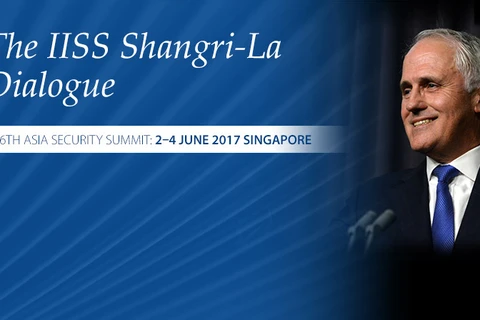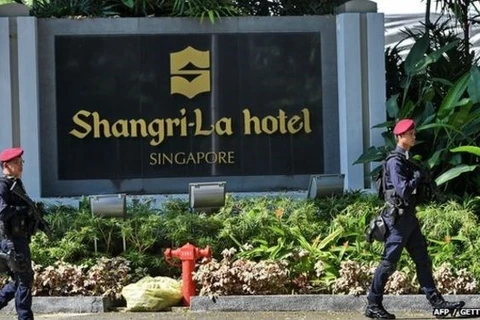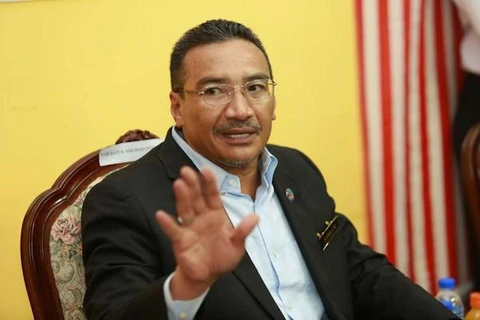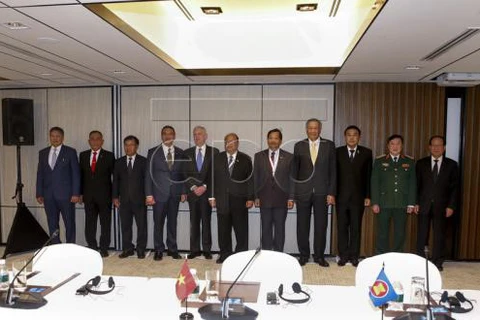Singapore (VNA) – Deputy Minister of Public Security Senior Lieutenant General Bui Van Nam has emphasised the need for ASEAN and China to implement the Code for Unplanned Encounters at Sea (CEUS) and operate a diplomatic hotline to settle problems at sea in an effective manner as part of measures to avoid collision at sea.
Addressing the fourth special discussion on practical measures to prevent encounters at sea in Singapore on June 3 as part of the 16th Shangri-La Dialogue, Deputy Minister Nam said that a state must not find excuses such as internal law to ignore requests to settle incidents at sea sent through the hotline.
At the same time, the CUES must be applied for all government vessels operating in the East Sea, including military and semi-military ships, he said.
He added that the ASEAN and China should work together for the early formation of a Code of Conduct in the East Sea (COC) which is binding, comprehensive, practical and acts as an effective tool to prevent disputes and maintain peace, stability, navigation and overflight security and safety in the East Sea.
Meanwhile, all countries should foster their cooperation in less sensitive areas at sea, including scientific research, maritime environment protection, natural disaster prevention, search, rescue and respond to terrorism, piracy, human trafficking, illegal migration, thus strengthen mutual understanding and minimise actions that may lead to misunderstanding and disputes, he said.
The enhancement of partnership at sea must be in line with full and strict implementation of international law, especially the UN Convention on the Law of the Sea 1982 (UNCLOS) and other regional agreements, as well as the respect for sovereignty and interest of other countries and ensuring the voluntary and responsible engagement of all sides for common interest.
Deputy Minister Bui Van Nam clarified that the international community should consider the establishment of a mechanism on gathering and connecting articles in existing international conventions and supplementing new ones to build shared codes of conduct and collective interference mechanism in unexpected situations at sea.
A comprehensive legal framework will help improve responsibility to implement international legal regulations and reduce the risks of dispute at sea, he stressed.
Nam affirmed Vietnam’s commitments to actively cooperating with ASEAN member countries and other states in and outside the region through regional and international forums such as the ASEAN, East Asia Summit, the ASEAN Defence Ministers’ Meeting Plus, and the ASEAN Regional Forum (ARF), thus contributing to speeding up the building of trust and realising of preventive diplomatic measures to minimise risks of encounters and disputes at sea.
Vietnam supports all initiatives and cooperation mechanisms benefiting the maintenance of peace, stability and promoting the peaceful settlement of disputes at sea on the basis of international law, he stated.
The Deputy Minister stressed that Vietnam backs the implementation of cooperation initiatives and projects at sea based on observing relevant international law and agreements, respecting and harmonising interest of all sides, as well as the increase of information and coordination in actions among governments, international organisations, experts and scholars on sea and ocean, thus contributing to building and implementing measures to prevent disputes at sea.
Participants also agreed that in order to handle disputes at sea, all parties should reach a joint perspective and not complicate the situation, while settling all issues through peaceful measures.
Earlier the same day, three special discussions were held on the nuclear danger in the region, new methods in security partnership and defence significance of new technology.-VNA
Addressing the fourth special discussion on practical measures to prevent encounters at sea in Singapore on June 3 as part of the 16th Shangri-La Dialogue, Deputy Minister Nam said that a state must not find excuses such as internal law to ignore requests to settle incidents at sea sent through the hotline.
At the same time, the CUES must be applied for all government vessels operating in the East Sea, including military and semi-military ships, he said.
He added that the ASEAN and China should work together for the early formation of a Code of Conduct in the East Sea (COC) which is binding, comprehensive, practical and acts as an effective tool to prevent disputes and maintain peace, stability, navigation and overflight security and safety in the East Sea.
Meanwhile, all countries should foster their cooperation in less sensitive areas at sea, including scientific research, maritime environment protection, natural disaster prevention, search, rescue and respond to terrorism, piracy, human trafficking, illegal migration, thus strengthen mutual understanding and minimise actions that may lead to misunderstanding and disputes, he said.
The enhancement of partnership at sea must be in line with full and strict implementation of international law, especially the UN Convention on the Law of the Sea 1982 (UNCLOS) and other regional agreements, as well as the respect for sovereignty and interest of other countries and ensuring the voluntary and responsible engagement of all sides for common interest.
Deputy Minister Bui Van Nam clarified that the international community should consider the establishment of a mechanism on gathering and connecting articles in existing international conventions and supplementing new ones to build shared codes of conduct and collective interference mechanism in unexpected situations at sea.
A comprehensive legal framework will help improve responsibility to implement international legal regulations and reduce the risks of dispute at sea, he stressed.
Nam affirmed Vietnam’s commitments to actively cooperating with ASEAN member countries and other states in and outside the region through regional and international forums such as the ASEAN, East Asia Summit, the ASEAN Defence Ministers’ Meeting Plus, and the ASEAN Regional Forum (ARF), thus contributing to speeding up the building of trust and realising of preventive diplomatic measures to minimise risks of encounters and disputes at sea.
Vietnam supports all initiatives and cooperation mechanisms benefiting the maintenance of peace, stability and promoting the peaceful settlement of disputes at sea on the basis of international law, he stated.
The Deputy Minister stressed that Vietnam backs the implementation of cooperation initiatives and projects at sea based on observing relevant international law and agreements, respecting and harmonising interest of all sides, as well as the increase of information and coordination in actions among governments, international organisations, experts and scholars on sea and ocean, thus contributing to building and implementing measures to prevent disputes at sea.
Participants also agreed that in order to handle disputes at sea, all parties should reach a joint perspective and not complicate the situation, while settling all issues through peaceful measures.
Earlier the same day, three special discussions were held on the nuclear danger in the region, new methods in security partnership and defence significance of new technology.-VNA
VNA
























